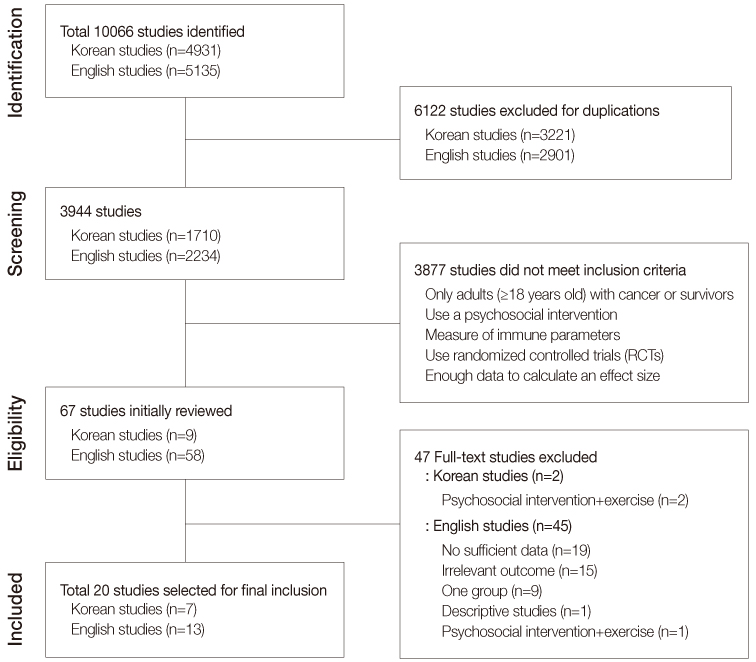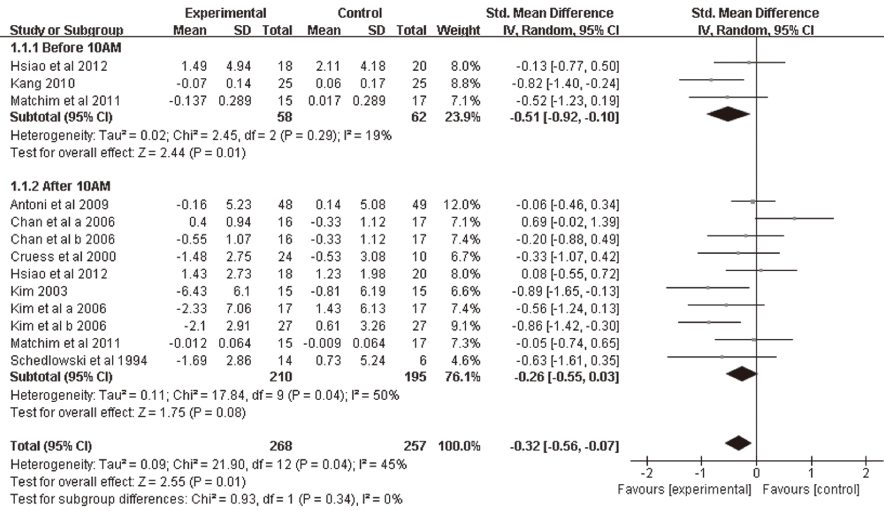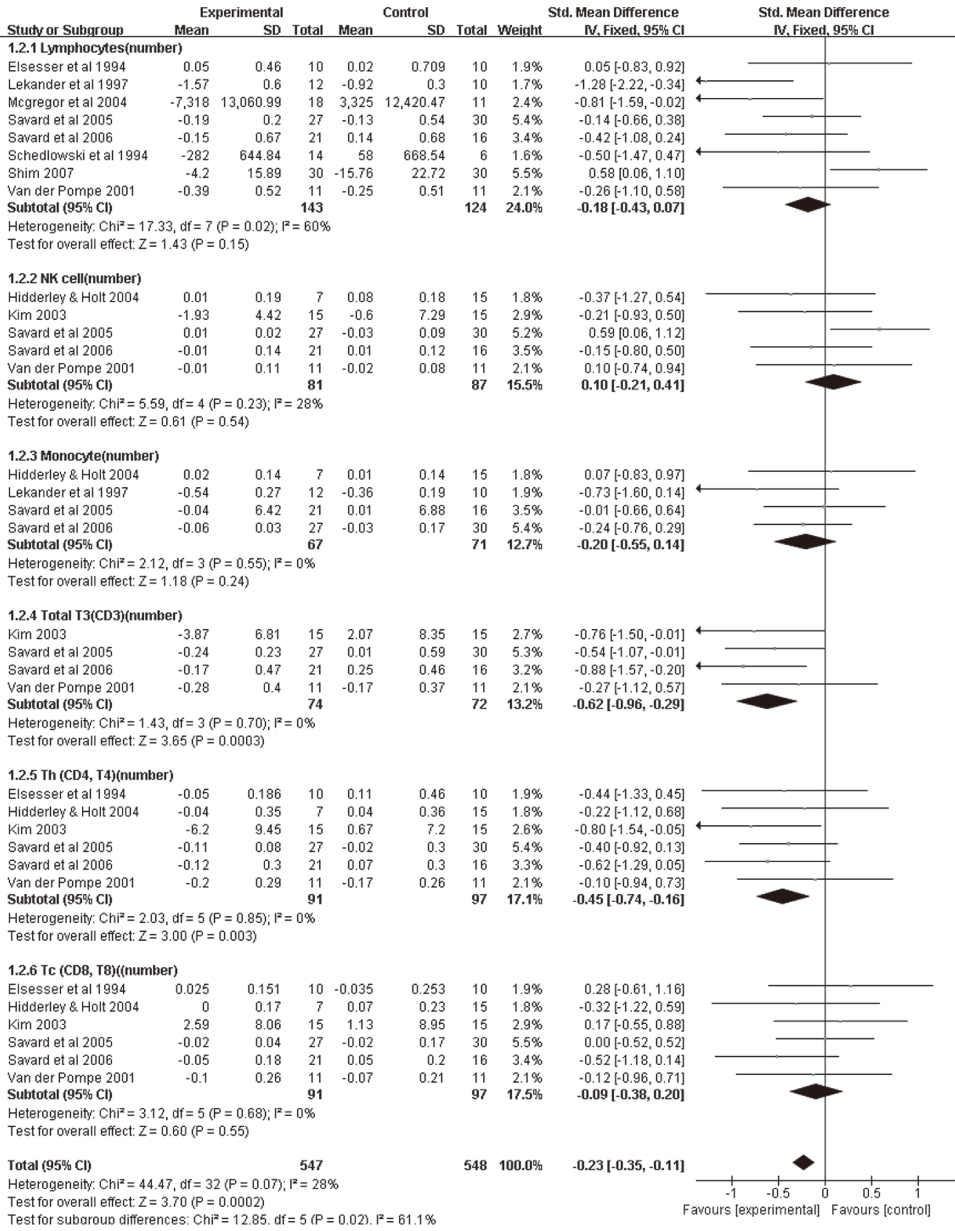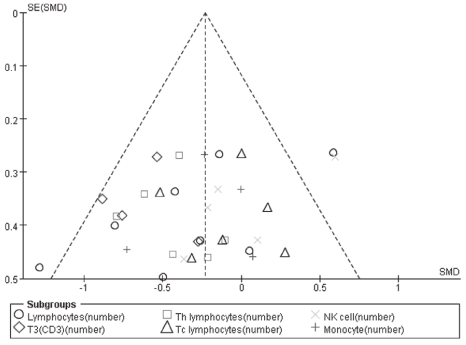J Korean Acad Nurs.
2014 Aug;44(4):446-457. 10.4040/jkan.2014.44.4.446.
Effects of Psychosocial Interventions on Cortisol and Immune Parameters in Patients with Cancer: A Meta-analysis
- Affiliations
-
- 1Department of Nursing, Sahmyook University, Seoul, Korea. ohpj@syu.ac.kr
- 2Department of Nursing, Graduate School, Sahmyook University, Seoul, Korea.
- KMID: 1791874
- DOI: http://doi.org/10.4040/jkan.2014.44.4.446
Abstract
- PURPOSE
This study was done to evaluate the effects of psychosocial interventions on cortisol and immune response in adult patients with cancer.
METHODS
MEDLINE via PubMed, Cochrane Library CENTRAL, EMBASE, CINAHL and domestic electronic databases were searched. Twenty controlled trials (11 randomized and 9 non-randomized trials) met the inclusion criteria with a total of 862 participants. Methodological quality was assessed using the Cochrane's Risk of Bias for randomized studies and the Risk of Bias Assessment tool for non randomized studies. Data were analyzed using the RevMan 5.2.11 program of Cochrane library.
RESULTS
Overall, study quality was moderate to high. The weighted average effect size across studies was -0.32 (95% CI [-0.56, -0.07], p=.010, I2=45%) for cortisol concentration, -0.62 (95%CI [-0.96,-0.29], p<.001, I2=0%) for T lymphocyte (CD3) and -0.45 (95%CI [-0.74, -0.16], p=.003, I2=0%) for Th lymphocyte (CD4) numbers. Psychosocial interventions were not effective for Tc lymphocyte (CD4), NK cell, monocyte, and cytokine response.
CONCLUSION
Although these results provide only small evidence of successful immune modulation, they support the conclusion that psychosocial interventions can assist cancer patients in reducing emotional distress and improving immune response.
Keyword
MeSH Terms
Figure
Reference
-
1. Shrock D, Palmer RF, Taylor B. Effects of a psychosocial intervention on survival among patients with stage I breast and prostate cancer: A matched case-control study. Altern Ther Health Med. 1999; 5(3):49–55.2. Kiecolt-Glaser JK, Glaser R, Cacioppo JT, MacCallum RC, Snydersmith M, Kim C, et al. Marital conflict in older adults: Endocrinological and immunological correlates. Psychosom Med. 1997; 59(4):339–349.3. Kim CJ, Hur HK, Kang DH, Kim BH. The effects of psychosocial interventions to improve stress and coping in patients with breast cancer. J Korean Acad Nurs. 2006; 36(1):169–178.4. Kim JN, I R. A review of research on the psychosocial interventions for the cancer patients. Korean J Health Psychol. 2008; 13(2):329–357.5. Jassim GA, Whitford DL, Grey IM. Psychological interventions for women with non-metastatic breast cancer. Cochrane Database Syst Rev. 2010; 10:CD008729. http://dx.doi.org/10.1002/14651858.CD008729.6. Fawzy FI, Fawzy NW, Arndt LA, Pasnau RO. Critical review of psychosocial interventions in cancer care. Arch Gen Psychiatry. 1995; 52(2):100–113.7. Spiegel D, Butler LD, Giese-Davis J, Koopman C, Miller E, DiMiceli S, et al. Effects of supportive-expressive group therapy on survival of patients with metastatic breast cancer: A randomized prospective trial. Cancer. 2007; 110(5):1130–1138. http://dx.doi.org/10.1002/cncr.22890.8. Spiegel D, Stroud P, Fyfe A. Complementary medicine. West J Med. 1998; 168(4):241–247.9. Oh PJ, Lee EA. Cognitive behavioral therapy for psychological distress, self care and quality of life in patients with cancer: A meta-analysis. Korean J Adult Nurs. 2013; 25(4):377–388.10. Sheard T, Maguire P. The effect of psychological interventions on anxiety and depression in cancer patients: Results of two meta-analyses. Br J Cancer. 1999; 80(11):1770–1780. http://dx.doi.org/10.1038/sj.bjc.6690596.11. Osborn RL, Demoncada AC, Feuerstein M. Psychosocial interventions for depression, anxiety, and quality of life in cancer survivors: Meta-analyses. Int J Psychiatry Med. 2006; 36(1):13–34.12. Miller GE, Cohen S. Psychological interventions and the immune system: A meta-analytic review and critique. Health Psychol. 2001; 20(1):47–63.13. Liberati A, Altman DG, Tetzlaff J, Mulrow C, Gøtzsche PC, Ioannidis JP, et al. The PRISMA statement for reporting systematic reviews and meta-analyses of studies that evaluate healthcare interventions: Explanation and elaboration. BMJ. 2009; 339:b2700. http://dx.doi.org/10.1136/bmj.b2700.14. Kim SY, Park JE, Seo HJ, Lee YJ, Jang BH, Son HJ, et al. NECA's guidance for undertaking systematic reviews and meta-analyses for intervention. Seoul: National Evidence-based Healthcare Collaborating Agency;2011.15. Higgins JPT, Green S. Cochrane handbook for systematic reviews of interventions version 5.0.0 [Internet]. Oxford, UK: The Cochrane Collaboration;2008. cited 2008 February. Available from: www.cochrane-handbook.org.16. Lee J. Meta-analysis. J Korean Endocr Soc. 2008; 23(6):361–378. http://dx.doi.org/10.3803/jkes.2008.23.6.361.17. Oh SS. Meta-analysis: Theory and practice. Seoul: Kon-Kuk University Press;2002.18. Chan CL, Ho RT, Lee PW, Cheng JY, Leung PP, Foo W, et al. A randomized controlled trial of psychosocial interventions using the psychophysiological framework for Chinese breast cancer patients. J Psychosoc Oncol. 2006; 24(1):3–26. http://dx.doi.org/10.1300/J077v24n01_02.19. Chow E, Tsao MN, Harth T. Does psychosocial intervention improve survival in cancer? A meta-analysis. Palliat Med. 2004; 18(1):25–31.20. Ranchor AV, Fleer J, Sanderman R, Van der Ploeg KM, Coyne JC, Schroevers M. Psychological interventions for cancer survivors and cancer patients in the palliative phase (Protocol). Cochrane Database Syst Rev. 2012; 1:CD009511. http://dx.doi.org/10.1002/14651858.CD009511.21. McGregor BA, Antoni MH, Boyers A, Alferi SM, Blomberg BB, Carver CS. Cognitive-behavioral stress management increases benefit finding and immune function among women with early-stage breast cancer. J Psychosom Res. 2004; 56(1):1–8. http://dx.doi.org/10.1016/s0022-3999(03)00036-9.22. Andersen BL, Kiecolt-Glaser JK, Glaser R. A biobehavioral model of cancer stress and disease course. Am Psychol. 1994; 49(5):389–404.23. Christensen AJ, Edwards DL, Wiebe JS, Benotsch EG, McKelvey L, Andrews M, et al. Effect of verbal self-disclosure on natural killer cell activity: Moderating influence of cynical hostility. Psychosom Med. 1996; 58(2):150–155.24. Chung CW, Lee S, Hwang SW, Park EH. Systematic review of exercise effects on health outcomes in women with breast cancer. Asian Nurs Res. 2013; 7(3):149–159. http://dx.doi.org/10.1016/j.anr.2013.07.005.25. Kim KS, Kim YS, Choi KO, Hyun KS, Yeun EJ, Kim SY, et al. Medicalsurgical nursing. 7th ed. Paju: Soomoonsa;2012.26. Bakke AC, Purtzer MZ, Newton P. The effect of hypnotic-guided imagery on psychological well-being and immune function in patients with prior breast cancer. J Psychosom Res. 2002; 53(6):1131–1137.27. Taylor EJ. Spiritual care: Nursing theory, research, and practice. Upper Saddle River, NJ: Prentice Hall;2002.28. Lee SY, Lee EE. Korean Americans' beliefs about colorectal cancer screening. Asian Nurs Res. 2013; 7(2):45–52. http://dx.doi.org/10.1016/j.anr.2012.10.001.
- Full Text Links
- Actions
-
Cited
- CITED
-
- Close
- Share
- Similar articles
-
- Meta-analysis of Psychosocial Interventions to Reduce Pain in Patients with Cancer
- Effects of Psychosocial Interventions for Patients with Breast Cancer: A Meta-analysis
- A Meta-Analysis of the Effects of Imagery
- Trends and Effects in Evidence-Based Psycho-Social Interventions for Patients with Diabetes
- Effects of Psychosocial Interventions for School-aged Children's Internet Addiction, Self-control and Self-esteem: Meta-Analysis





